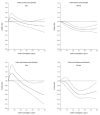Cuppa joe: friend or foe? Effects of chronic coffee consumption on cardiovascular and brain health
- PMID: 22338737
- PMCID: PMC6181718
Cuppa joe: friend or foe? Effects of chronic coffee consumption on cardiovascular and brain health
Abstract
Caffeine is the most widely consumed psychoactive drug worldwide. Indeed the majority of adults consume caffeine on a daily basis, most commonly in the forms of coffee and tea. Coffee, in particular, is the favored caffeine source in the United States, where more than 150 million people drink coffee on a daily basis. Coffee, one of the richest sources of antioxidants in the average American's diet, contains caffeine and other antioxidants that have the potential to confer both beneficial and adverse health effects. A growing body of research shows that coffee drinkers, compared to nondrinkers, may be less likely to develop type 2 diabetes, stroke, depression, death from any cause, and neurodegenerative diseases, including Parkinson's and Alzheimer's. Coffee appears to have a neutral effect on cardiovascular health. Although more research is clearly needed, coffee, when consumed without added cream or sugar, is a calorie-free beverage that may confer health benefits, especially when used in individuals who do not have adverse subjective effects due to its stimulating effects, and when coffee is substituted for less healthy, unnatural, and/or high-calorie beverages, such as colas and other sugary and artificially sweetened sodas and soft drinks.
Figures







References
MeSH terms
Substances
LinkOut - more resources
Full Text Sources
Medical
